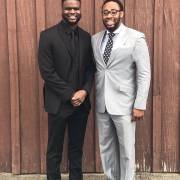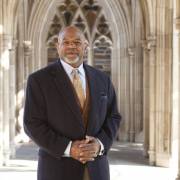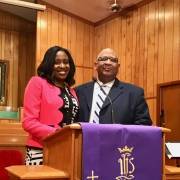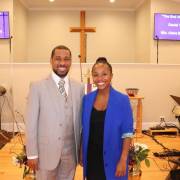For Julian Mercer, M.Div. ’19, learning how to deliver a sermon in the classroom is academic. “You can apply the theories, you can read all the preaching books, you can go to all the conferences—but you only get better at preaching by preaching.”

In March, six students and six alumni ministers from Duke Divinity School participated in the Office of Black Church Studies Preaching Sunday. The Reverend Mycal X. Brickhouse, M.Div. ’16, assistant director of alumni relations, says the program gives divinity students a chance to form relationships within the community. The pilot is the brainchild of David Emmanuel Goatley, research professor of theology and Black Church studies and director of the Office of Black Church Studies.
Students proclaimed the Word in local churches in the Triangle area, including three Baptist churches, an AME Zion Church, a United Methodist Church, and a Christian Church. “All of these students are seniors,” Goatley explains. “We wanted to foster relationships between black Divinity School alumni in the area with students and to give students opportunities to experience more diverse congregational life. Some people think all churches are alike. And that’s as wrong as saying all men are alike or all women are alike.”
Development and Formation

Pastor W.C. Turner Jr. of Mt. Level Baptist Missionary Church in Durham (and James T. and Alice Mead Cleland Professor Emeritus of the Practice of Preaching) believes that the way one is formed is crucial. “The church provides an important context. It’s not the same as the classroom setting,” says Turner, M.Div. ’74, G ’84. “You need a live setting around real people. It’s the interaction between the congregation and preacher that is crucial in the development of young preachers.”
“Growth is exponential on the front end,” Turner explains. “You can know a lot but it may not translate into the congregational setting.”
“Julian [Mercer] did nicely,” he says. “It was second time he preached at my church. Julian is not a youngster; he’s a bit further along. He handled himself in a way that showed some development has already happened for him.”
He’s also a familiar face to church members. “He’s worked with the young people. People like to see you in the pulpit and outside the pulpit,” Turner says.
Mercer first came to the church for his field education in fall 2018. Master of Divinity candidates are required to perform at least 800 hours of field education. That means going out and preaching sermons, assisting the needy, and serving congregations in churches and faith-based nonprofit organizations.
Many of the field education placements are with the United Methodist Church. Duke University has historical ties with the church.

The Reverend Dewey Williams, M.Div. ’11 believes many Black students feel a sense of isolation at Duke Divinity because of it. “Duke has a connection with United Methodist churches, but the majority of Black students are not Methodist,” says Williams, pastor of Mt. Bright Baptist Church in Hillsborough.
“It doesn’t represent the churches the students come from nor where they will serve,” he says. “I did my own field placement at United Methodist church; I went to rural churches. But I came from the inner city. It was opportunity to do services, but it wasn’t where I was coming from or where I was going.”
Preaching Styles
“There is a vast distinction between preaching for black folks and white folks,” Williams says. “The expectations are higher for black congregations. People are expecting the preacher to move, inspire. … They want to be lifted.”
“You have to be able to speak the same language and understand the problems,” Mercer says. “White people seem to like a more heady and intellectual style. Good preaching can do both, but if you can’t make the people feel something you are not going to last long in the Black church. You have to transcend the mind and hit people in the heart.”
At the same time, the Black community includes a variety of preaching styles. Notable preachers have ranged from the late Gardner C. Taylor, referred to as the poet laureate of the pulpit because of his smooth blending of biblical narrative with poetic eloquence, to the Reverend Charles G. Adams of Detroit, who was described as “an essayist who reads from a manuscript and makes people weep and shout.”

Aisha Benton M.T.S. ’19 describes herself a poet using imagery and metaphor to get her message across. She was hosted by Brickhouse’s Cary First Christian Church in Cary.
Angel Clark, M.Div. ’19 does come from the United Methodist Church. “This was my first time preaching at a Baptist church. I was initially nervous because I’m not a whooper.” She’s referring to the tradition of some Black ministers to use call and response to heighten the experience of those receiving the message.
Clark set the tone in her sermon, “You are your own competition.” She was addressing some of the issues tugging at young people such as low self-esteem, jealousy of others, and taking the next step after high school and college graduations. But she was also talking to herself. She quoted a line from rapper Cardi B’s song, “Best Life”: “I'm my own competition, I’m competin’ with myself.”
“Angel Clark did a marvelous job,” reports Williams, who hosted Clark at his church. “It was her first time preaching at a Black Baptist church and she did her homework.”
Clark learned an importance lesson from her visit. “Don’t assume anything about the worship style of a church. Be open,” she says. “Stay true to who you are.”
The Changing Face of the Pulpit
Pastor Donna Banks, M.Div. ’06 says the pilot program gave her an opportunity to support the school and African American students.
Ashley Cross, M.Div. ’19 engaged the congregation. “We had a potluck meal afterward. Everyone enjoyed hearing what she had to say," Banks says. “Ashley also brought another person of color to the mix besides me,” Banks says. She is the first African American and woman to lead McMannen UMC in Durham, a predominately white church.
Many of her congregants have been exposed to people of color in a work setting, but not so much in a church setting. “Ashley kind of reinforces other women as preachers and leaders,” Banks says.
Goatley is pleased with the response to the initial Preaching Sunday. “The congregations welcomed them. Alumni pastors were very kind, supportive, and encouraging. This was a pilot program, but we would like continue it to have one in both the fall and spring semesters.”
***
By Bridgette A. Lacy
Photos courtesy of pastors Mycal Brickhouse and Dewey Williams